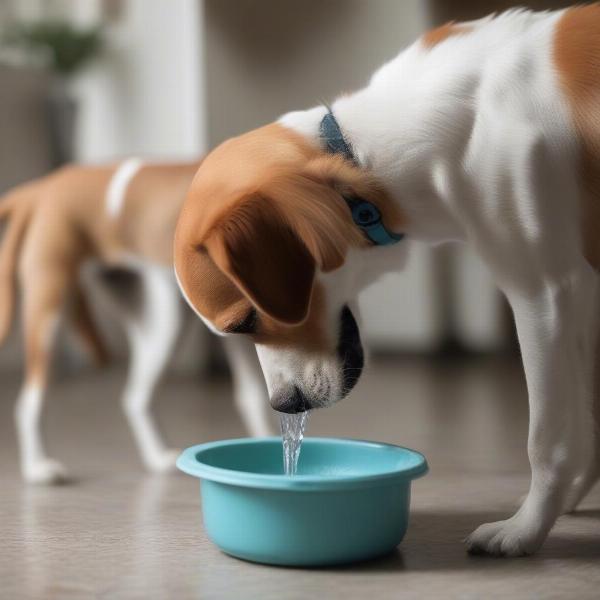Fishy breath in dogs is rarely a sign your furry friend has been secretly snacking on seafood. More often than not, this unpleasant odor points to underlying health issues that require attention. This article will delve into the common causes of fishy dog breath, how to address them, and when it’s crucial to seek veterinary advice.
Unveiling the Causes of Fishy Dog Breath
Several factors can contribute to that distinctive fishy smell emanating from your dog’s mouth. While poor oral hygiene is a common culprit, more serious medical conditions can also be at play.
Oral Hygiene Issues
Just like humans, dogs can develop plaque and tartar buildup, leading to gingivitis and periodontal disease. These conditions create a breeding ground for bacteria, which can produce volatile sulfur compounds, resulting in that tell-tale fishy odor. Regular brushing, dental chews, and professional cleanings can significantly improve your dog’s oral health and banish bad breath.
Kidney Disease
Fishy breath can be an early indicator of kidney disease. As the kidneys struggle to filter waste products, these toxins can build up in the bloodstream and be released through the breath. If you notice persistent fishy breath accompanied by other symptoms like increased thirst, frequent urination, or lethargy, consult your veterinarian immediately.
Liver Disease
Similar to kidney disease, liver problems can also manifest as fishy breath. The liver plays a vital role in detoxification, and when its function is compromised, toxins can accumulate, leading to bad breath and other more serious health issues. A veterinary examination is essential to diagnose and manage liver disease.
Oral Tumors
While less common, oral tumors can also cause fishy breath. These growths can become infected or ulcerated, leading to a foul odor. If you notice any unusual lumps or growths in your dog’s mouth, seek veterinary attention promptly.
Dietary Factors
Occasionally, a dog’s diet can contribute to fishy breath. Certain types of fish-based dog food can leave a lingering odor, even after digestion. Switching to a different protein source might resolve the issue. However, if the fishy smell persists, further investigation is necessary to rule out other potential causes.
Addressing Fishy Dog Breath at Home
Improving your dog’s oral hygiene is the first step in combating fishy breath. Regular brushing with dog-specific toothpaste, providing dental chews, and offering dental treats can significantly reduce plaque and tartar buildup.
When to Seek Veterinary Care
If your dog’s fishy breath persists despite improved oral hygiene, it’s crucial to consult your veterinarian. They can perform a thorough examination, including blood tests and oral assessments, to determine the underlying cause. Early diagnosis and treatment of conditions like kidney or liver disease are essential for ensuring your dog’s long-term health and well-being.
 Dog drinking fresh water
Dog drinking fresh water
Conclusion
Fishy breath in dogs is more than just an unpleasant odor; it can be a sign of underlying health concerns. By addressing oral hygiene and seeking prompt veterinary care when necessary, you can help your canine companion maintain a healthy mouth and overall well-being. Don’t dismiss that fishy smell – it could be your dog’s way of telling you something’s not quite right.
FAQ
- Is fishy breath normal in dogs? No, persistent fishy breath is usually a sign of an underlying issue, such as poor oral hygiene or a medical condition.
- How can I improve my dog’s oral hygiene? Brush their teeth regularly with dog-specific toothpaste, provide dental chews, and offer dental treats.
- When should I take my dog to the vet for fishy breath? If the smell persists despite improved oral hygiene or is accompanied by other symptoms like increased thirst or lethargy.
- What medical conditions can cause fishy breath in dogs? Kidney disease, liver disease, and oral tumors can all contribute to fishy breath.
- Can my dog’s diet cause fishy breath? Occasionally, fish-based dog food can contribute to the odor, but persistent fishy breath warrants a veterinary check-up.
- What tests might a vet perform to diagnose the cause of fishy breath? Blood tests, urinalysis, and a thorough oral examination are common diagnostic tools.
- How can I prevent fishy breath in my dog? Maintaining good oral hygiene, regular veterinary check-ups, and a balanced diet are key preventive measures.
Find More Helpful Advice on ILM Dog
You can find more articles about dog health and care on ILM Dog. Check out these related articles:
- [Link to article on dog dental care](URL to relevant article if available)
- [Link to article on dog nutrition](URL to relevant article if available)
About ILM Dog
ILM Dog (ilmdog.com) is your trusted international resource for expert dog care advice. We offer comprehensive information on breed selection, health, training, nutrition, grooming, and more, catering to both new and experienced dog owners worldwide. Our team of experts is dedicated to providing practical and reliable information to help you provide the best possible care for your furry friend. For personalized advice and to learn more about our services, contact us at [email protected] or call us at +44 20-3965-8624.